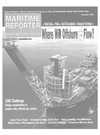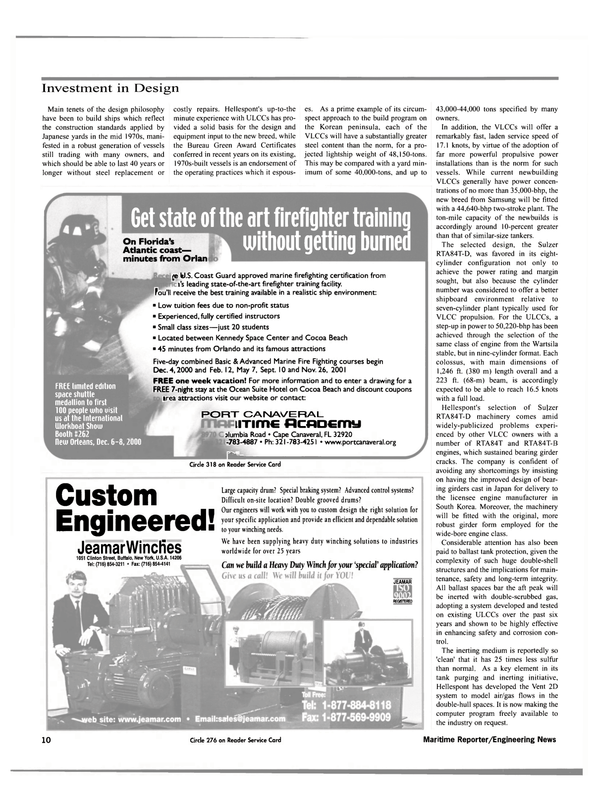
The Future Of E-Commerce: Will The Maritime Industry Be Left Behind?
Maritime business commerce has changed rapidly over the last decade. In order to stay competitive, companies are increasingly inventing more efficient ways to conduct business. The advent of the Internet has created new tools to negotiate and complete business transactions for all major industries. Electronic commerce ("e-commerce") in particular, is revolutionizing the way industries transact all business. The buzzwords of today's marketplace are speed, accuracy and efficiency. Businesses are turning to the Internet as an outlet to increase sales and market share. A successful transition from paper to electronic business, however, requires a well-established electronic and legal infrastructure in order to succeed.
The information technology industry is now challenged with the task of creating compatible electronic systems through which multinational parties may transact business more efficiently. The expansion of business-to-business ecommerce has also challenged the legal industry to create new legal assurances for parties involved in electronic transactions.
The transactions previously negotiated on paper and culminating in a signature and a handshake now require the guarantee of document authentication and party-identity validation. These challenges are being met with the creation of electronic security measures designed to protect the transaction.
So where does the maritime industry fit into this technological and legal transition?
Given the complexity of maritime transactions, the industry must establish its role during this transition and determine how best to proceed in today's electronic marketplace.
Technological Issues Related to Business-to-Business E-Commerce In order for business to be able to communicate electronically through an exchange of documentation, a need developed for an electronic system capable of paperless commerce. This need led to the creation of Electronic Data Interchange ("EDI"). EDI is the computer- to-computer exchange of specifically formatted messages creating commercial documentation. EDI converts information that would traditionally be transmitted in paper form to electronic messages. In order to benefit fully from the use of EDI, the contracting parties' electronic systems must be compatible and capable of directly communicating with all parties involved. Currently.
most systems capable of running EDI are mainframe computers and not desktops. Therefore, the two businesses involved in a transaction must have highly compatible mainframe systems capable of running EDI to ensure the required level of standardization. This required standardization naturally excludes smaller businesses with incompatible systems from the exchange of electronic documentation.
The maritime industry has not been a principle leader in EDI, however efforts have consistently been made over the years to transfer key documents electronically, such as the bills of lading.
SEADOCS was the first effort launched to create an electronic bill of lading system.
The venture eventually failed due to high-added transaction costs and confidentiality concerns from the maritime industry, since all trading information would be recorded and kept in a central location.
There currently exists no standard data form other than EDI in which the documents may be exchanged. The Comite Maritime International (CMI) has, however, created model rules for transmission of electronic bills of lading under EDI, which the parties to a transaction can adopt by agreement. Other industries have created standardized data exchange systems, which have been very successful. The SWIFT system (Society for Worldwide Interbank Financial Telecommunications), for example, established a standardized exchange for letters of credit communications between banks and beneficiaries.
The efficiency of document exchange via e-commerce for the maritime industry can only be increased if a better mode of online information exchange is created. Currently, standardization outside of the EDI realm is left to the individual parties.
Not only must the industry itself develop a standard data format, but also EDI in general will need to be modified in order to survive. Large multinational corporations have their own data systems in place through Internet websites and are dictating individual data exchange mechanisms with their customers and suppliers.
This type of competition with EDI should foster the proper environment necessary to create new and uniform data exchange systems capable of use and acceptance by companies at all levels of capitalization.
Legal Issues Related to Business-to-Business E-Commerce As with paper documentation, electronic contracting gives rise to legal rights and duties. Transitioning business-to-business commerce to e-commerce requires applying traditional procedures for creating binding agreements, establishing assured payment mechanisms and settling disputes to Internet transactions. Evidence of electronic transactions must be made sufficiently reliable to prove the making of and the contents of the contracts. The goal today is to put electronic transactions on the same legal level of acceptability and uniformity as paper transactions. In order to achieve this goal, three critical issues must be evaluated before transacting maritime business via e-commerce: security of the transaction, negotiability of the terms, and choice of governing law.
Business-to-business e-commerce raises multiple security issues for the maritime industry. For example, how will parties ensure that the bill of lading or purchase order has not been tampered with during transmission from the buyer to the seller?
Authentication and validation of electronic documentation is a major concern for any industry conducting business over the Internet. With EDI, the parties only have the transmitted document from the transferor without any assurance as to authenticity or lack of alteration. The advent of digital signatures, with the use of public and private keys, to pass secure messages through a trusted third party, or certification authority, will soon become the norm to ensure security and promote confidence in electronic transactions. The CMI already incorporated the use of digital signatures into its model electronic bill of lading rules.
In addition to security issues arising in e-commerce transactions, there is the concern of negotiability. E-commerce transactions have rendered purchases and sales more automated and there are concerns that purchasers are losing negotiating power. With electronic contracts exchanged between the parties, the methods of acceptance and rejection have changed. Today sellers are providing contracts to buyers with non-negotiable terms, and there is no longer a battle of the forms issue. Acceptance may be construed from the moment the buyer places the order and the legal recourse available to the buyer is in many cases already dictated in the pur- chase order. Before accepting the agreement, it is critical that the parties understand the terms as stated. With these new developments across the maritime industry, it is clear that e-commerce is changing the nature of business transactions in general.
The parties must also consider what legal framework will control the transactions.
Ordinarily the terms of the agreement control what law will govern the transaction, however, in the absence of such terms there are agreements providing guidance. For example, the U.S.
Uniform Computer Information Transaction Act (UCITA) provides guidelines to determine the law governing a transaction in the absence of an agreement between the parties. When drafting transaction documentation with choice of law provisions, parties should consider the location of their customers and their assets. Given the international nature of the maritime industry, great consideration must also be given to the local laws of host countries that might govern industry sales through company Internet web pages.
Electronic technology is a vital means of development for the maritime industry.
To promote increased speed, accuracy and efficiency in transactions, the industry must eliminate the need for processing necessary transactional documentation in paper forms and instead create ways to complete transactions electronically directly between the parties.
Creation of a standardized system of data exchange, incorporating the necessary legal terms to provide for secure transactions, will properly launch the maritime industry into the realm of ecommerce where it belongs.
Natalia IV. Geren is an associate with Dyer Ellis c£ Joseph, P.C., a Washington, DC.-based law firm with a domestic and international practice involving transportation, shipping, finance, porate, securities, legislative, mental, and trade matters.
Read The Future Of E-Commerce: Will The Maritime Industry Be Left Behind? in Pdf, Flash or Html5 edition of November 2000 Maritime Reporter
Other stories from November 2000 issue
Content
- Cornering the ULCC Niche page: 8
- The Future Of E-Commerce: Will The Maritime Industry Be Left Behind? page: 12
- Shipowners, Charterers Launch New Internet-Based Shipping Exchange page: 15
- Shipbuilders Complain To EU About S. Korean Subsidies page: 16
- Robert Allan Lands Fireboat Design Contract page: 16
- Tribon Solutions Signs Contract With DHI page: 18
- FBMA Babcock Secures TriCat Order page: 19
- Keppel Shipyard Is Awarded Jumboization Contract page: 19
- World Single Hull Tanker Phase-Out Is Coming page: 22
- INTERTANKO Calls For "Reasoned Solution" In Wake Of Single Hull Phase Out page: 23
- Exxon Mobil Appeal Rejected page: 24
- IMO Forum To Address High-Density Oil Spills page: 24
- Greek Ferry Disaster Will Result In Safety Enhancements page: 26
- New Safety Technology Unveiled page: 26
- Oil Instability, consolidation Muddy Offshore E&P Picture page: 27
- World Floater Market Is Stable page: 29
- Olympic Engine Selection Evokes Thoughts Of "Green" page: 31
- Volvo Penta Offers Larger Engine Range page: 33
- MTU Presents New 8000 Series page: 34
- ZF Fortifies Product Line, Business Plan page: 36
- ABS Innovates For Petrobras Project page: 40
- Environmentally Sound, Commercial Efficient Wastewater Treatment page: 45
- Ansell Jones Uniquely Serves Offshore Market page: 48
- Deepwater Business Prospects Ripe page: 49
- W&D Completes Moran Series page: 50
- Atlantic Marine Awarded Additional ATB Contract page: 50
- Klyne Tugs Orders AHTS From China page: 52
- What Happened to the Hunley: ? page: 58
- Companies Bond Together To Form American Salvage Association page: 64
- Gas Ship Design Challenges page: 66
- McAlear Named CEO Of Kvaerner Philadelphia Shipyard page: 73
- Historical Keel Laying Occurs At Ingalls page: 74
- Polish Shipbuilding Industry Consolidates, While Competition Continues To Boom page: 75
- PRS Seeks Strong Comeback, Stresses Safety page: 80
- New Marine Technology: The Hallmark of SMM 2000 page: 81
- The "Wired" Ship page: 88
- Flat Screens, Big Images page: 88
- Wartsila Unveils Plans For The Future page: 89
- Wartsila To Provide Power On Unique Icebreaking Tankers page: 90
- Kvaerner Delivers Explorer of the Seas page: 94
- The SatCom Shakeout page: 95


